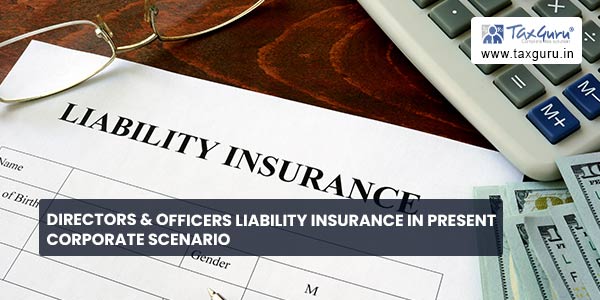Directors and Officers Liability Insurance, often known as D&O Liability Insurance is a type of a liability Insurance and is a relatively newer concept in the Indian Corporate scenario.
Though gaining popularity with each passing day due to the heavy compliances and imposition of liability on the top management of the Company and the rising of white-collar crimes along with accounting irregularities, corruption etc., it is yet to become a corporate custom.
Corporate frauds leading to even arrests of Directors of the Company because of their active involvement has now become an everyday news owing to which it is often advised to protect oneself when acting in the position of the Director or Officer of the Company with the D&O Liability Insurance.
The D&O policy covers personal liability of directors, officers and employees arising due to wrongful acts while performing duty. It also covers defence costs and other expenses incidental to a loss. Since the Directors and officers of the Company are holding a fiduciary position in the Company, they are thus liable for the all the acts committed by them under the management and supervision of the Company. This Insurance provides a protection to them in case of any legal liability is arisen against them by the shareholders, employees, creditors or stakeholders of the Company. It is thus a protection against the personal civil liability of the Directors and Officers.
Unlike Motor Insurance which is mandatory under the Motor Vehicles Act, D&O Liability Insurance is not mandatory in India, but the same is in vogue because of the increased compliance requirements and liability on the Directors and officers of the Company.
Though not express but there are few provisions of the Companies Act, 2013 which reflects the necessity of the D&O Insurance and points towards the same.
In this regard the first and foremost section that shall be looked at it is Section 2(60) which defines ‘officer who is in default’. Under various Sections of the Act, more specifically under Section 12, 15, 16, 39, 53, 212 and 248, the penal liability is imposed on the officer in default, which includes Whole Time Director, KMP, Directors of the Board among others.
For better understanding the definition of ‘Officer’ should also be read in conjunction with ‘officer who is in default’.
As per Section 2(59), ‘officer’ includes any director, manager, or key managerial personnel or any person in accordance with whose directions or instructions the Board of Directors or any one or more of the directors is or are accustomed to act.
In light of the various corporate frauds experienced by the Country in the last two decades and the failure of the then existing Corporate Laws to handle the same and protect the stakeholders, the Companies Act, 2013 has also defined the term ‘Fraud’ and states that a person who is guilty of it may be punished by imprisonment for up to 10 years, and where fraud involves the public interest, the minimum sentence prescribed is three years. Fraud, as defined by the explanation to section 447 of the 2013 Act, includes any act or abuse of position committed with intent to deceive, to gain undue advantage from, or to injure the interests of a person, company, shareholders, or creditors, whether or not there is wrongful gain or loss.
To summaries, it can be said that in case of any mishappenings in the Company due to the actions of the Directors and Officers of the Company, the top most management shall be the first to get hold of their collars by the aggrieved party or the stakeholders of the Company. Here, D&O Insurance comes into play by providing a protection to the Directors and other officers from any personal losses if they are sued because of the actions taken while in the position of Director/Officer. It covers the legal fees along with any other type of liability that may be incurred by the business organization due to the filing of the lawsuit.
In such a case, when one holds such a controversial position, it becomes needful to have an insurance to protect you and help you with the hefty monetary compensations, if and when they are imposed.
Other sections of the Companies to consider in reference of the D&O insurance are:
1.Section 149 – Company to have Board of Directors
Section 149(12) imposes a liability on an Independent Director and a non-executive Director not being a promoter or Key Managerial Personnel (KMP) for acts of omission or commission by the Company.
The section though has given a defense to the liable personnel by using the word ‘Only’ before the specific acts under which they can be held liable. Accordingly, the Independent Director and the Non-executive Director not being a promoter or KMP shall be held liable only;
- For Such acts of omission or commission by a Company which had occurred with his knowledge, attributable through Board processes and with his consent or connivance, or,
- Where he has failed to act diligently.
However, it would not be incorrect to state that the defence so provided in the section has a wide scope and it may become arduous to prove innocence in the Court of law.
Imposition of such grave liability and monetary penalty on Independent Directors sometimes make them seek the path of resignation when the Management and the Board fails to look after their concerns. Resignation seems like the last option in such cases to safeguard themselves from any further involvement in the alleged mishappening of the Company.
2. Section 166 – Duties of Directors
The Act clearly and expressly specifies the Duties of the Director that he/she shall fulfil as a director which is not limited to but includes –
- To act in accordance with the articles
- To act in good faith towards the objects of the Company and for the benefit of Company, Members, Employees, Shareholders, community and Environment.
- To act with due diligence and exercise independent judgement, among other.
The point worth noting in this provision is the use of word ‘SHALL’, which clearly denotes the intent of the lawmaker to impose a liability on the Director towards the fulfilment of the Duties specified and not merely giving a suggestion.
Furthermore, if a director fails to comply with the duties specified and contravenes the provision of this section, he/she shall be punishable with minimum fine of Rs 1L which may extend to Rs 5L.
Therefore, if proven guilty it may lead to levy of vigorous pecuniary penalty on the Director apart from the loss of trust and faith of the Company and its stakeholders in the Director.
3. Section 168 – Resignation of Director
Where the Director of the Company has resigned from the Company, his liability shall still remain for the offences occurred during his tenure even if the legal actions are taken after his resignation from the Company.
So, the Director cannot escape the liability for the offences that transpired during his tenure just by resigning from the Company i.e. an erstwhile director may still be held liable for the defaults ensued during his tenure.

4. Section 197 – Overall maximum managerial remuneration and managerial remuneration in case of absence or inadequacy of profits
Subsection 13 of the said section provides for the treatment of insurance premium taken by the Company for its directors and officers.
It says that where any insurance is taken by a Company on behalf of its:
- Managing Director,
- Whole-time Director,
- Manager,
- Chief Executive Officer,
- Chief Financial Officer or
- Company Secretary
For indemnifying them against any liability occurring due to negligence, default, misfeasance, breach of duty or breach of trust for which they may be guilty in relation to Company, then the premium paid on such insurance shall not be treated as part of remuneration payable to such personnel.
However, if such personnel are proven guilty then the premium paid on such insurance shall be treated as part of the remuneration payable to such personnel.
5. Schedule IV – Code for Independent Directors
This is the only place in the whole Act where the explicit reference to the D&O has been provided.
Schedule IV is a guide to professional conduct for independent directors, compliance of which is mandatory in terms of section 149(8).
Point IV provides for the manner of Appointment of the Independent Director and as per point 4, the appointment of Independent Director shall be formalized through a letter of Appointment which shall set out provision for Directors and Officers (D and O) Insurance, if any, among other things.
This is the only part of the Act where D & O has found a place in its own name, which implies how absolutely necessary it is for the Independent Director to negotiate for D & O insurance as a part of the Appointment letter.
D&O for Listed Companies
Listed Companies are the Companies whose securities are listed with the Stock Exchange viz-a-viz, National Stock Exchange of India or Bombay Stock of India.
Such Companies are required to comply with the Act, Rules and Regulations of SEBI in addition to the Companies Act. An express requirement triggers the buying of D&O Insurance by Listed Companies.
As per the SEBI (Listing Obligations and Disclosure Requirements) Regulations or SEBI (LODR) Regulations for the sake of brevity, it is mandatory for the Listed Companies to undertake Directors and Officers Insurance for its Independent Directors.
As per Regulation 25(10), the top 500 Listed entities in terms of Market Capitalization shall undertake D&O Insurance for all its Independent Directors, the quantum and the risks of which shall be decided by the Board of Directors.
Also, as per Regulation 25(12); inserted SEBI (LODR) (Fifth Amendment) Regulations, 2021, a ‘high value debt listed entity’ shall also undertake D&O Insurance for its Independent Directors for such sum assured and risks as may be decided by the Board.
High Value Debt Listed Entity are those entities which has listed its Non-Convertible Debt Securities and has an outstanding value of listed non-convertible debt securities of Rupees Five Hundred Crores and above. (Regulation 15(1A) of SEBI LODR).
D&O Insurance for Non-Profit Organizations
People tend to be misguided about the D&O Insurance and believes that it is required and necessary only for the big organization working globally and who are engaged in high-risk industry. However, this is only a misconception.
Directors and Officers of even a mid sized organization are equally exposed to personal liability due to their position.
Non-Profit Organizations are most exposed to such litigations due to their position and impact in the society. One wrong move by them, even if unintentional can entangle them in a legal battle that can prove to be not just harmful but also financially draining. It is extremely important for the Board of a Non-Profit Organization to protect the organization as well as the Directors and Officers with a D&O Insurance. Be mindful of the fact that taking up an insurance does not prevent the happening of the event but it do help in mitigation of the risks and losses that may arise of because of happening of that event.
Therefore for all Non Profit Organizations, big or small, a D&O Insurance is a must.
Conclusion
In the present corporate scenario, it is not difficult to understand the importance and necessity of safeguarding oneself with the Insurance of a kind as discussed above. If we as an Individual are not casual about our life Insurances then why treat a D&O differently even though its equally essential.





Since D&O Policy protects Directors and officer against personal civil liability. Can Input tax credit availed on premium paid for D&O Policy?
Nicely article written on Directors & Officers Liability Insurance
Thank you for taking out time to read this article and appreciating it.